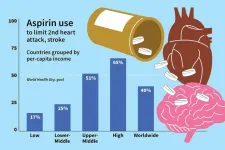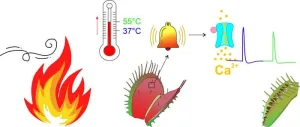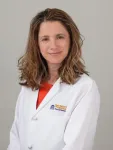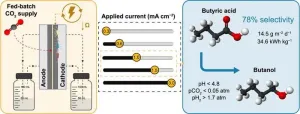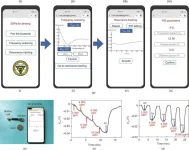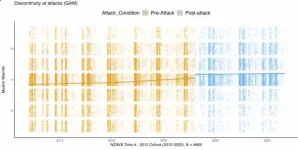(Press-News.org) For people who have experienced a heart attack or stroke, taking a daily aspirin has been shown to help prevent a second one. Yet, despite aspirin’s low cost and its clear benefits in such scenarios, fewer than half of people worldwide who have had a heart attack or stroke take the medication, according to a new study led by researchers at Washington University School of Medicine in St. Louis and the University of Michigan.
The study appears Aug. 22 in JAMA.
Cardiovascular disease, including heart attack and stroke, is the leading cause of death globally. Multiple studies conducted in the 1970s and 1980s established that antiplatelet therapy — including aspirin — can reduce the risk of a second cardiovascular event, such as a second heart attack or stroke, by about one-quarter. Since then, daily aspirin has been recommended for this purpose. Daily aspirin therapy is also generally affordable. In the U.S., a monthly supply of baby aspirin (81 milligrams per dose) can cost from $2 to $8, depending on the retailer and the amount purchased.
“Survivors of heart attacks and stroke often face a high risk of having subsequent events,” said first author Sang Gune Yoo, MD, a cardiovascular disease fellow in the Cardiovascular Division at Washington University School of Medicine. “In fact, many people die from having recurring attacks. Aspirin offers one effective and relatively low-cost option for reducing the likelihood of additional events in individuals with established cardiovascular disease, and yet most people who could benefit from a daily aspirin don’t take it.”
According to Yoo, the new study can’t explain why aspirin is so underused, but there likely are multiple intersecting explanations, including varying accessibility to health care in general, inconsistent messaging surrounding use of the drug, and the fact that aspirin is not always available over-the-counter, requiring a prescription in some countries.
Despite the benefits of aspirin, the study showed that in low-income countries, only 16.6% of eligible individuals — those who had experienced a first heart attack or stroke — were taking aspirin to prevent a second heart attack or stroke. In lower-middle-income countries this number was 24.5%. It increased to 51.1% for upper-middle-income countries, and to 65% in high-income countries, including the United States.
Myriad factors contribute to the risk of heart attacks and strokes such as smoking, diabetes, unhealthy diet, genetics, lack of exercise, obesity and even air pollution. Aspirin works as a blood thinner, preventing small blood cells called platelets from forming clots. These clots can block arteries and contribute to a reduction in the amount of oxygen-rich blood being delivered to vital organs. Such blockage also can cause other complications, including a heart attack or stroke.
The researchers, including senior author David Flood, MD, an assistant professor in the Division of Hospital Medicine at the University of Michigan, analyzed data from nationally representative health surveys that were conducted in 51 low-, middle- and high-income countries. The surveys included questions about people’s medical history of cardiovascular disease and on aspirin use. The study included 125,505 individuals, with 10,590 self-reporting a history of cardiovascular disease.
An earlier study that was conducted by a different group of researchers, the Prospective Urban Rural Epidemiology cohort study, was published in 2011 and found similarly low aspirin usage. Despite international efforts to improve access to cardiovascular disease medicines, including aspirin, from 2011 through 2023, aspirin remains severely underused. Yoo said this lack of progress underscores the urgent need to continue developing and implementing interventions to promote aspirin use.
“We might expect that after 10 years there would be more widespread aspirin use, but things haven’t really changed,” Yoo said. “This research deals with a disease process that affects many people, regardless of where you live. We have to remember that this could benefit a tremendous number of people.”
Interventions, according to Yoo, should take a multipronged approach and should consider the contexts in which they’re being implemented. Such approaches could involve repurposing system-level strategies deployed to manage other chronic conditions, such as HIV/AIDS.
“Particularly in lower-middle-income countries, there is often a good infrastructure for caring for patients living with HIV or other endemic disease,” Yoo notes. “We can think about restructuring that so that we can also address comorbidities of heart attack and stroke such as cardiovascular disease as part of those existing systems, instead of having to reinvent the wheel.”
Interventions also could take place where aspirin is easily available, targeting pharmacies or primary care physicians to make the drug more accessible to eligible patients.
“In order to create interventions, we have to understand what is actually going on, which is what we’re trying to establish in this study,” Yoo said. “Then we can start to think about how to develop strategies to increase evidence-based aspirin use in order to save lives.”
###
This work was supported by the National Institutes of Health (NIH), grant numbers K23HL161271, P30DK092926 and 5P30AG024824; and the University of Michigan Caswell Diabetes Institute Clinical Translational Research Scholars Program.
Yoo SGK, et al. Aspirin for secondary prevention of cardiovascular disease in 51 low-, middle-, and high-income countries: a cross-sectional study of nationally representative, individual-level data. JAMA. Aug. 22, 2023.
About Washington University School of Medicine
WashU Medicine is a global leader in academic medicine, including biomedical research, patient care and educational programs with 2,800 faculty. Its National Institutes of Health (NIH) research funding portfolio is the third largest among U.S. medical schools, has grown 52% in the last six years, and, together with institutional investment, WashU Medicine commits well over $1 billion annually to basic and clinical research innovation and training. Its faculty practice is consistently within the top five in the country, with more than 1,800 faculty physicians practicing at 65 locations and who are also the medical staffs of Barnes-Jewish and St. Louis Children’s hospitals of BJC HealthCare. WashU Medicine has a storied history in MD/PhD training, recently dedicated $100 million to scholarships and curriculum renewal for its medical students, and is home to top-notch training programs in every medical subspecialty as well as physical therapy, occupational therapy, and audiology and communications sciences.
END
Aspirin can help prevent a second heart attack, but most don’t take it
Daily aspirin use is inexpensive and could reduce cardiovascular deaths globally
2023-08-22
ELSE PRESS RELEASES FROM THIS DATE:
Poor report card for children’s wellbeing
2023-08-22
While COVID-19 lockdowns are no longer mandated, the stress and anxiety of the pandemic still lingers, especially among young South Australians, say health experts at the University of South Australia.
In a new study released today, researchers show that children’s mental health and wellbeing have gradually worsened over the past six years, particular during and post the pandemic.
Examining measures of wellbeing – life satisfaction, optimism, happiness, cognitive engagement, emotional regulation, perseverance, worry, and sadness – ...
Heat sensor protects the Venus flytrap from fire
2023-08-22
The Venus flytrap can survive in the nutrient-poor swamps of North and South Carolina because it compensates for the lack of nitrogen, phosphate and minerals by catching and eating small animals. It hunts with snap traps that have sensory hairs on them. If an insect touches these hairs two times, the traps shut and digests the prey.
In its location in the swamp, the carnivorous plant is often not visible because it is overgrown by grass. In summer, the grass dries up. Then it can catch fire from the frequent lightning storms typical of North Carolina – ...
Cleveland Clinic-led team awarded $2.8 million to translate cancer cell evolution research to clinical care
2023-08-22
The National Institutes of Health recently awarded Cleveland Clinic’s Jacob Scott, M.D., D.Phil., and collaborators $2.8 million to translate research on how cancer cells evolve and compete into patient care. The project aims to move previous advances done in vitro closer to clinical reality by developing computer and preclinical models side-by-side, a significant step in the fight against multidrug-resistant cancers that are responsible for more than 90% of cancer deaths.
This is a milestone for ...
Digital real estate listings with more photos, descriptions earn higher sale prices
2023-08-22
AMES, IA — Buying a home is a time-consuming process, in part because it requires balancing financial realities with a long checklist of expectations and desires. People care about a solid foundation and certain number of bedrooms. But a property’s curb appeal, neighbors and proximity to work or good schools also matter.
For most house-hunters in the U.S., setting up filters and scrolling listings on Zillow has become a crucial first step.
“Digital real estate platforms like Zillow help people see what’s available, ...
Can sound waves help people quit cocaine? Cutting-edge clinical trial focuses in
2023-08-22
Pioneering researchers at UVA Health are testing whether focused sound waves can help people overcome cocaine addiction, a growing problem across the nation.
The scientists have launched a clinical trial, believed to be the first of its kind in the world, to test whether low-intensity focused ultrasound can help reprogram brain cells to reduce the desire for cocaine. The noninvasive approach focuses sound waves on a portion of the brain called the insula, thought to play a critical role in multiple forms of addiction. If the trial is successful, it could pave the way for an important new tool to treat addiction in general.
“This ...
Innovative breakthrough in sustainable chemical production
2023-08-22
Carbon capture and utilization (CCU) technologies are crucial for addressing climate change while ensuring economic viability. MES has emerged as a promising approach for CO2 reduction to biofuels and platform chemicals. However, the industrial adoption of MES has been hindered by low-value products like acetate or methane and high electric power demand.
In a new study recently published on 26 July 2023, in the journal Environmental Science and Ecotechnology, researchers from University of Girona conducted a study that focused on electrically ...
Detroit Public Schools Community District staff complete CPR training and education
2023-08-22
DETROIT, August 22, 2023 — Today, Detroit Public Schools Community District teachers and coaches completed either the American Heart Association’s Heartsaver® CPR AED (automated external defibrillator) course, which provides the highest quality evidence-based training in the lifesaving skills of CPR, as well as the appropriate use of an AED, or Hands-Only CPR education. Adding lifesavers to the chain of survival in the Detroit community through CPR training and education is a priority for the Detroit Lions Foundation.
“We are honored to use our platform to further bring awareness and education to our community ...
Groundbreaking Ultracompact Spoof Surface Plasmon Sensing System Revolutionizes Gas Detection with Smartphone Integration
2023-08-22
A team of researchers from Southeast University of China has developed a cutting-edge ultracompact sensing system that leverages the power of spoof surface plasmon resonance (SSPR) technology to enable adaptive and accurate gas detection using a smartphone. The research article detailing this breakthrough, titled "An Ultracompact Spoof Surface Plasmon Sensing System for Adaptive and Accurate Detection of Gas Using a Smartphone," has been published in the prestigious journal Engineering.
Traditional dielectric sensing methods often suffer from signal fluctuations, resulting in reduced sensitivity and accuracy. In response to the growing demand for precise gas detection in ...
Unintended consequences: Terror attacks cause long-term acceptance of targeted communities
2023-08-22
Violent actions intended to provoke opposition to particular communities may paradoxically lead to lasting acceptance, according to a study. On March 15, 2019, a far-right extremist killed 51 Muslims in Christchurch, New Zealand. Immediately following the attacks there was a noticeable increase in public acceptance of the Muslim minority in the country. But was this acceptance sustained? To address this question, Joseph Bulbulia and colleagues used years of data from the New Zealand Attitudes and Values Study, a national longitudinal study. The author’s goal was to estimate the anticipated level of Muslim acceptance if the attacks had not occurred. These ...
Uranium signatures in turtles and tortoises near nuclear testing and waste sites
2023-08-22
The shells of turtles, tortoises, and sea turtles keep growing as long as the animals live—and some of them live a remarkably long time. Cyler Conrad and colleagues analyzed the shells of five specimens from areas that potentially accumulated anthropogenic uranium through nuclear fallout and/or waste. Unusual uranium signatures were found in a green sea turtle from Enewetak Atoll in the Republic of the Marshall Islands, a desert tortoise from southwestern Utah near the Nevada National Security Site (formerly known as the Nevada Test Site), a river cooter from the Savannah River Site in South Carolina, and a box turtle from Oak Ridge, Tennessee, ...
LAST 30 PRESS RELEASES:
Reconstructing the world’s ant diversity in 3D
UMD entomologist helps bring the world’s ant diversity to life in 3D imagery
ESA’s Mars orbiters watch solar superstorm hit the Red Planet
The secret lives of catalysts: How microscopic networks power reactions
Molecular ‘catapult’ fires electrons at the limits of physics
Researcher finds evidence supporting sucrose can help manage painful procedures in infants
New study identifies key factors supporting indigenous well-being
Bureaucracy Index 2026: Business sector hit hardest
ECMWF’s portable global forecasting model OpenIFS now available for all
Yale study challenges notion that aging means decline, finds many older adults improve over time
Korean researchers enable early detection of brain disorders with a single drop of saliva!
Swipe right, but safer
Duke-NUS scientists identify more effective way to detect poultry viruses in live markets
Low-intensity treadmill exercise preconditioning mitigates post-stroke injury in mouse models
How moss helped solve a grave-robbing mystery
How much sleep do teens get? Six-seven hours.
Patients regain weight rapidly after stopping weight loss drugs – but still keep off a quarter of weight lost
GLP-1 diabetes drugs linked to reduced risk of addiction and substance-related death
Councils face industry legal threats for campaigns warning against wood burning stoves
GLP-1 medications get at the heart of addiction: study
Global trauma study highlights shared learning as interest in whole blood resurges
Almost a third of Gen Z men agree a wife should obey her husband
Trapping light on thermal photodetectors shatters speed records
New review highlights the future of tubular solid oxide fuel cells for clean energy systems
Pig farm ammonia pollution may indirectly accelerate climate warming, new study finds
Modified biochar helps compost retain nitrogen and build richer soil organic matter
First gene regulation clinical trials for epilepsy show promising results
Life-changing drug identified for children with rare epilepsy
Husker researchers collaborate to explore fear of spiders
Mayo Clinic researchers discover hidden brain map that may improve epilepsy care
[Press-News.org] Aspirin can help prevent a second heart attack, but most don’t take itDaily aspirin use is inexpensive and could reduce cardiovascular deaths globally
